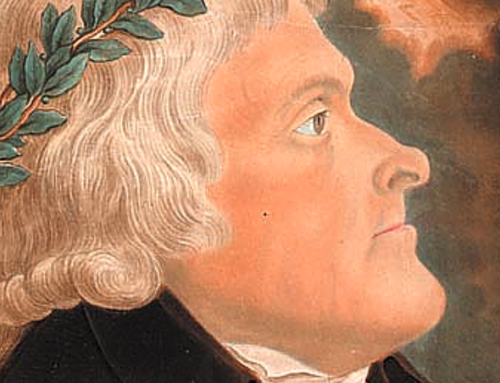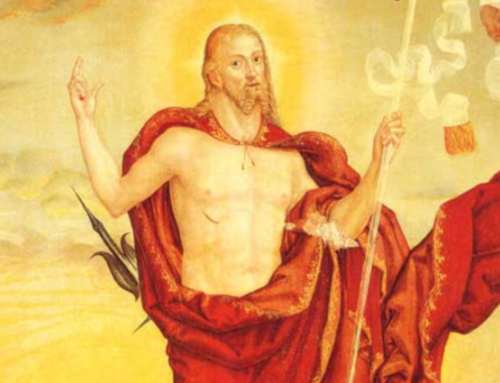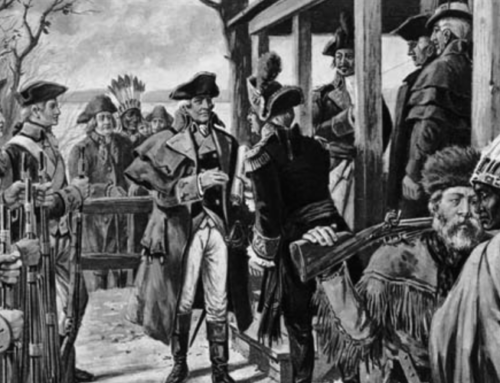When Russell Kirk passed away he was surrounded by his loving family, in the house he built on his ancestral land. This was fitting for a man who always wished to lead a life of “decent independence.” He had sought to provide for his family while remaining free from compromising entanglements. He did not want gratitude to some benefactor to cloud his judgment or tempt him to defend the “Permanent Things” with less than his full vigor.
Kirk knew the value of economic liberty. Living by his wit and wisdom he could support himself only in a free economy. Only a free market could produce the publishing houses and other organizations that helped him put his views before the public. Only economic liberty allowed the public to accumulate disposable time and money to spend considering his ideas.
But Kirk’s goal was never wealth. It was economic independence. It was the freedom to do what was right without fear of the taxman, the bank repossessor, or an angry patron.
Money is a necessity of life, and economic effort should be rewarded. But we must not mistake the pursuit of money for the pursuit of a good life. Kirk sought to preserve his life in Mecosta and this required, among other things, money. But he who pursues money for its own sake will lose his Mecosta—his ties to his ancestors, his ability to love and be loved by his family, his understanding that it is in a moral life that man is free, not in a life chained to the constant pursuit of short-lived, worldly pleasures.
The pursuit of money for its own sake constitutes the deadly sin of avarice; a sin with which our age is all too familiar. As Kirk argued,
Avarice has been the exacting passion of society for more than a century. In every age, for that matter, avarice—like the other deadly sins—is incalculably powerful; but societies governed by moral tradition always have endeavored to keep this rice wader by the employment of countervailing farces and impulses, if only by the power of satirical admonition. Our modern lime, however, has seen the relaxation of nearly every curb upon avarice. Avarice, naked or veiled, now is popularly acclaimed a virtue.
We have mistaken greed for industry, sin for virtue, a comfortable life for a good life. Those who find in free markets the key to happiness have fallen under the same spell of ideology that controls Marxists and other worshippers of the state. They seek a ready, universal mechanism—be it market or state—that will solve all life’s problems. But there is no mechanism that can produce utopia. And the attempt to build one produces only misery. Any decent life requires that we seek to protect and enrich our culture—the historically given institutions, beliefs, and practices that make up our way of life.
Kirk’s magnum opus The Conservative Mind forged a conservative movement that has lasted forty years precisely because it was a work of cultural conservatism. It gave no ideological blueprint for the “good society.” Instead it told the story of our conservative patrimony—of seers who have set forth important visions of the good life. It pointed readers not toward abstract philosophy or mechanistic institutions, but toward the eternal standards of natural law and our inheritance of custom and prescription.
Today cultural conservatism is criticized as irrelevant, dangerously reactionary, or worst of all banal by “sophisticated” observers. And not just by liberals, but also by many within the conservative movement. The past is past, we are told. We must look forward to an age in which we will construct, for ourselves, a freer, more prosperous life. We will maintain social peace with rules and contracts of mutual benefit, secure in the knowledge that we can satisfy our deepest longings if only freed to do so. Certain customs may be useful, on this view, but we must not enslave ourselves by holding onto an unjust (“racist, sexist, and homophobic”) and irretrievable past.
This rejection of tradition rests on the conviction that what makes us distinctly human (if anything) is our ability to decide for ourselves what kind of life we should live, and to put such decisions into action through our choice of career, sexual conduct, and political life. The key word, of course, is “choice.” We must be free to choose our own lifestyle and character.
But when we see choice as itself the proper goal of life, or even politics, we feed into liberal materialism and moral relativism. Kirk did not argue that choice is in itself evil. Instead he pointed out that our true choice is between a life of authentic freedom, in which we seek to serve God, and a life in which we enslave ourselves to our own base appetites.
Taken by itself, choice is essentially empty. Choice means freedom to choose. Freedom to choose means a lack of constraints. And, unfortunately, freedom from constraints has come to mean freedom from all constraints—including religious sanction, custom, and material scarcity or poverty.
Given such freedom, what then is left? Two things: pride and greed. The overweening pride of one who believes he can create anew both himself and his society, out of his own reason and will. The greed for money and sensual pleasures to which men descend when they are torn from their natural attachments and service to family, friends, and neighbors.
Everything becomes a matter of economics. We even discover “philosophies” of economics, according to which this or that form of exchange will create happiness and prosperity. And it is true that some economic systems—say, ones based on private property—are more conducive to happiness and prosperity than others—say, state socialism. But economic ties cannot bind. They cannot maintain social peace, let alone a good life, in the absence of deeper, more fundamental understandings concerning proper conduct and the proper ends of life. If a people seeks only wealth it will fail to procure even this base goal. The people will end by pursuing directly the sensual pleasures money can buy. And the result will be violence and fraud.
As Kirk put it,
One lust never is gratified, and that is the lust for power. Men possessed by this lust are more gluttonous that Faustus Gluttony himself, who modestly aspires merely to victuals. And when every other motive to action is stilled by satiety, and when the world is crapulous with boredom, then the lust after power will be doubled and redoubled, even among men who otherwise would be content with obscurity; because only in the frantic rape of power will there then be relief from that depression which follows hard upon indulged sensuality.
A man who pursues only sensual pleasure loses his moral compass. Even if he succeeds in all his greedy endeavors he will be dissatisfied because his goals are by nature unsatisfying. Dispirited, he will seek happiness by dominating his fellows. And when an entire society gives itself over to sensual pleasures it will be a society no longer, but rather a collection of rapacious would-be tyrants.
Economic arrangements are important because they affect the fundamental institutions in which we lead our lives; the institutions in which our very characters are formed. The customs by means by which we exchange goods with one another constitute an important part of our culture. If our economy becomes a slavish, state-run enterprise our culture will become slavish as well. If selfish greed comes to rule our economic relations it will destroy the bonds of affection that hold our society together. And man, if freed from his social bonds, becomes a mere beast.
Those who would destroy economic liberty in the name of “social justice” seek to establish a hellish utopia. They would stifle all individuality and warp human nature in attempting to produce a “universal benevolence” that is impossible. One cannot love the human species as a whole—that way lies the hypocrisy of a Rousseau, who left his own children at the door of the foundling home, to their almost certain death, because the duties of fatherhood might take him away from the supposedly more important business of saving humanity from its customary ways of life. But neither can we form good characters and act properly if we surrender ourselves to faceless economic mechanisms that tear us from our natural attachments. We cannot love our neighbors if we see them as mere inputs into the machinery of progress and prosperity.
The bureaucrat’s social welfare scheme and the capitalist ideologue’s divinization of greed both undermine man’s true nature. They both dispense with what Kirk called “the old motives to morality and diligence which conservatives always had believed in: religious sanctions, tradition, habit, and private interest restrained by prescriptive institutions.”
Fear of God, love for our accustomed ways and associates, respect for law and our inheritance. These make us want to do right. Unfortunately, having dispensed with such motives, we have spawned a generation of literally fatherless children, who know well how to ‘progress’ in material terms—by stealing, dealing drugs, and otherwise preying on their fellows—but, because they are without families and communities, do not know how to lead good lives.
Good lives consist of virtue. They may not be comfortable and easy. But they fulfill our deeper longings—for affectionate attachments and the knowledge that we at least are trying to do God’s will. And the virtues are not hard to find. All societies have set down basic rules of conduct akin to our Ten Commandments and Golden Rule, and our poets and philosophers have restated those commandments in numerous ways over the centuries,
Standards of virtue are unpopular with today’s intellectuals. But these standards still apply to us because they are permanent things—no society can long survive without them. Our culture in particular provides much room for advancement in life. And advancement is a proper goal, provided it is pursued properly, through the provision of service to our fellow man—whether in commerce, in politics, in the clergy, or, perhaps most importantly, in daily life. But a society can survive the rigors of a just liberty only if its members are attached to and seek to serve the family, friends, and neighbors who make up their community.
We cannot dismiss self-interest. But we must build on it. This is why the family is the key to virtue, and to society itself. Aristotle observed that communities are based on the habits of friendship first formed in the family. Attached by nature and necessity to our parents, we become accustomed to them and seek their approval. We observe them and listen to them (more or less) because we both need and love them. They protect us and teach us how we should act.
Only after learning from our parents do we have the habits and attitudes necessary to deal with neighbors and others, to take the next step in that long chain of attachments leading to public life. Edmund Burke pointed out that “to love the little platoon we belong to in society, [is] the first principle (the germ, as it were) of public affections. It is the first link in the series by which we proceed towards a love to our country and to mankind.” We must learn how to love others. Such learning is possible only within the intimate relations of family and local life. And even here we cannot learn virtue if we do not accept that it is good to serve those we know and love.
Our dilemma is that many in our society, and the bulk of our political system, purposely undermine the traditional norms and attachments that foster virtue. Our schools teach children that to think morally they must reject accepted beliefs in the name of an empty, self-indulgent “authenticity.” Our government mandates “social justice” in the form of an equal and unprincipled distribution of material goods and a distribution of employment opportunities on the basis of race and sex. In sum, we are in the grip of social engineers hostile to the very idea of virtue.
A people taught that justice consists of a certain distribution of material goods soon dispenses with justice altogether. A people taught to “question authority” ends by questioning everything except its own base appetites. Such a people destroys all accepted norms. It produces moral and political chaos.
As Kirk put it,
If men assume that norms are no better than the pompous fabrications of their ancestors, got up to serve the interests of a faction or an age, then every rising generation will challenge the principles of personal and social order, and will learn wisdom only through agony.
There is opportunity as well as danger in our time of crisis. Conservatives may set aside their differences and concentrate on their common opposition to the Leviathan state. But they must resist two temptations: the one, to attempt to use Leviathan’s power for good ends. Leviathan’s power is illegitimate and inherently corrupting. Its schemes can “empower” no one. They can only further encourage the people to look to bureaucrats in Washington for physical and moral sustenance. They dispense with individual virtue and social action and so corrupt us all.
The other temptation: to despair of our culture and people, despite their vast reservoir of good will and common sense. However corrupt the times, we have no choice but to conserve what is good and reinvigorate our culture by looking to its roots, We must look to the virtues still latent in local institutions that are, after all, permanent things—things we cannot replace with abstract theories of either history or rights.
Kirk proposed no magical mechanism to restore our virtue. But he did offer advice, as well as his own example, on how we might return to a life of decent independence. We must reject both the state and the faceless corporate structure as would-be saviors. Instead we must return to a more modest life, lived in reinvigorated communities beholden to neither federal nor corporate bureaucrats.
Kirk recommended the humane economic vision of Wilhelm Roepke. He praised Roepke’s proposal that we learn from Switzerland’s economy, in which “the industrial worker… if necessary, can find his lunch in the garden, his supper in the lake, and can earn his potato supply in the fall by helping his brother clear his land.” An economy that is free but decentralized, in which men are dependent on neither the state nor the massive, inefficient corporation, would allow us to pursue the good life of local affection.
America is not Switzerland, as Kirk knew well. We will not return soon in large numbers to the small towns and countrysides in which our ancestors lived their lives. But Kirk’s teaching and example can show us how to better our lot. Pursuing wisdom more than wealth, decency more than fame, independence more than power, we can lead better lives and encourage our fellows to do so as well. Then perhaps the light of religious and moral principle will allow us to see beyond the dreams of avarice to a reality in which we attempt to do unto others as we would have them do unto us.
Books on the topic of this essay may be found in The Imaginative Conservative Bookstore. Reprinted with the gracious permission of The Intercollegiate Review (Fall 1994).








One of the best essays I have read in a very long time. I think all of us must do our best to cultivate the good life. Our government and big business culture are increasingly corrosive and corrupting as Kirk said. Sadly, this trend seems to be getting worse. But, just maybe this latest financial crisis and its ongoing impact will force real people to re-think what really is important in their lives. Already I have seen some of that happening. And that is good.
Interestingly, it is THIS playing field which conservatives have a better than average chance of success (as opposed to the confrontational games in politics). When presented with the benefits of cultural conservatism, only the seriously unthinking will ignore the obvious.
@David Naas: I agree entirely with the first part of your comment, but would love to believe that "…only the seiously unthinking will ignore the obvious," were entirely true.
It is this which we must learn and teach. It is this which will attract voters. This is much different than the popular conception of conservatives as firstly misers, and then sometimes prudes. It is this vision which will attract people, and it is this which will enable them to live better lives.